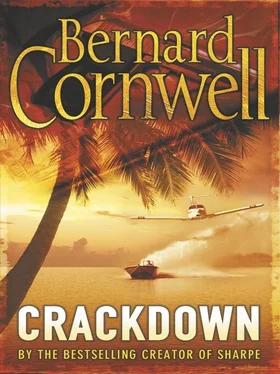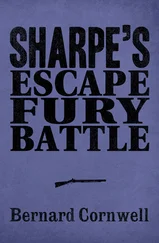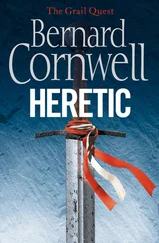“Help me with the skiff,” I said to Thessy.
“You think someone’s on board?” he asked with a trepidation that matched my own, for God only knew what horrors might be concealed in the darkness of those cabins.
Thessy and I unlashed the skiff that hung from Wavebreaker ’s stern davits, I climbed aboard, and Thessy worked the electric motors that lowered me down to the small petulant slap of the early morning waves.
Ellen appeared on deck just as I was casting off. She was dressed in a Winnie-the-Pooh T-shirt that served as her nightdress. She yawned, then scowled at the Belgian yacht.
“Morning!” I shouted cheerfully.
She scowled at me, but said nothing. Ellen was never at her brightest and best first thing in the morning.
I pulled the skiff’s outboard into life, then puttered across to the waterlogged yacht. As I got close I saw that her underwater hull had been holed by bullets which must have been fired from inside the boat because all the splinters had been driven outwards so that the hull looked like some giant and exotic sea urchin with red and white fibreglass spines.
I tied the skiff’s painter to one of Hirondelle ’s cleats and climbed gingerly on to the foredeck where I cautiously lifted what was left of the forward hatch to peer into the bow cabin. I half expected to see a body, but there was only dark water sloshing a few inches beneath the deck. No blood had been diluted by the water, or none that I could see. I edged my way aft and stepped down into the flooded cockpit. I steeled myself to look into the main-cabin, but I need not have worried for the big saloon was as blessedly empty of horror as the forecabin. Hirondelle held nothing but flotsam; so much flotsam that the water in her main-cabin looked like sludge. My eyes adjusted to the gloom and I saw that the sludge was really a thick layer of floating cornflakes, loose cigarettes, and a million scraps of foam that must have been shattered out of the hull by the gunfire. Embedded in that heaving mess were a plastic mug, some wooden clothes pegs, a broken pencil, a red shirt and a mutilated, sodden chart. There was a dark smear on the lip of the coachroof that might have been blood, but could just as easily have been a spill of varnish.
“What happened to her?” Ellen shouted. Wavebreaker had now drifted so close to Hirondelle that the schooner’s huge hull was casting a shadow over me.
“God knows.” I pulled the flimsy remnants of the chart out of the water.
“Are we going to salvage her?” Ellen was leaning over Wavebreaker’ s rail and the sun, rising behind her, turned her mass of red hair into an incandescent haze.
“She’s beyond help!” I called back. The waterlogged Hirondelle was much too heavy for Wavebreaker to take in tow, and I had neither the time nor the equipment to patch the hull and pump it dry. Besides, Hirondelle had been so badly damaged that no yard would ever think of trying to rebuild her. Not only had the Belgian boat been riddled with bullets, but I could see great gouges where an axe had been taken to the boat’s decking. It all seemed so pointless. Hirondelle had clearly been a beautiful boat, yet someone had wantonly tried to destroy her.
I tossed the soaking chart into the skiff and stooped to see if there was anything else I should take from the cabin. I was not searching for plunder, but rather for any clue as to who might have owned this boat or what might have provoked its destruction. I found nothing, except that as I stepped back from the companionway my bare feet trod hard and painfully on some lumpish sharp objects. I ducked down in the cockpit, groped on the grating underfoot, and came up with a handful of cartridge cases. Some were brass, but most were green-lacquered steel. They were 7.62 millimetre cartridges, military issue, and I had a half-memory from the dozy days when I had slept through the perfunctory Warsaw Pact familiarisation lectures that only a few East European countries lacquered steel cartridges green.
It was all very peculiar. A Belgian boat in Bahamian waters with Warsaw Pact cartridges? What was clear to me was that someone must have stood in this cockpit and fired a machine-gun down the companionway into the main-cabin. They had hoped to shatter the bottom of the hull so that Hirondelle would sink without trace, but they had not reckoned with the foam sandwiched in the boat’s hull, and thus the evidence of their crime, if crime it was, still floated.
Thessy had started Wavebreaker ’s engines. The wind had been driving the big schooner down on to Hirondelle so now Thessy gave the schooner’s propellers a burst of power that churned the sea white and drove her clear. The schooner’s shadow vanished, letting the new day’s sun slash at me with brilliant force and lance through a line of bullet holes that had pierced the side of Hirondelle ’s coachroof. The shafts of new sunlight lay like spears of gold in the cabin’s muck-ridden gloom. I wondered if I should explore the boat further, but decided that such an exploration was best left to the police.
I tossed my handful of cartridge cases into the skiff, then went forrard along Hirondelle ’s flooded deck to where an undamaged whisker pole lay in its foredeck clips. I tied the red shirt to the pole’s top, then rammed my makeshift flagpole into one of the bullet holes so that the treacherous hulk would be visible to any other mariner. Then I climbed back into the skiff, feeling oddly desolate. There is something very sad about mindless destruction, especially of a boat.
I went back to Wavebreaker where, as Thessy stowed the skiff, I called the Royal Bahamian Defence Forces on the VHF radio. I reported our position and my opinion that Hirondelle was a danger to navigation; then, feeling very virtuous, I revealed my discovery of the empty cartridge cases and my suspicions that the Belgian boat, and perhaps its crew, had met with a sinister fate. The Bahamian radio operator did not seem particularly interested.
Ellen, who had come below to pull on a pair of shorts and a shirt, listened to the last words of my transmission. “That was a waste of time,” she said scornfully.
“Why?” I had long learned not to be offended by Ellen’s caustic remarks. She had an Irish-American mother and a Polish-American father, which volatile blend had produced a girl of startling beauty and nitro-glycerine temper.
“Just what do you think happened to that boat?” she asked me in a venomous voice. “You think it’s something simple like an insurance scam? Or a clumsy waste-disposal job?” She paused, waiting for my answer, but I gave her none. “Drugs,” she answered for me.
“We don’t know that,” I protested.
“Oh, Nick!” Ellen was exasperated. “These are the Bahamas! Whoever was on that boat was stupid enough to get involved with drugs, and if you get involved with that boat’s fate, then you’ll be just as stupid. Which means that you should chuck that chart and those cartridges overboard. Now.”
“I shall hand them over to the proper authorities,” I said stubbornly.
“God save me from feeble-minded males.” She turned towards the galley. “You want some coffee?”
“The prime purpose of the Defence Forces is to guarantee freedom of navigation in Bahamian waters,” I said very pompously.
“Oh, sure!” Ellen laughed as she pumped water into the kettle. Thessy was still on deck where he had reset Wavebreaker ’s sails and taken the helm. I glanced at the fluxgate compass over the chart table to see that we were once again heading northwards. Ellen lit the galley stove, then unscrewed the lid from the jar of instant coffee. “The real purpose of the Bahamian Defence Forces”—she pointed a teaspoon at me to emphasise her words—“is to present the appearance of being zealously engaged in the war against drugs; which appearance of diligence is designed solely to placate the American government who otherwise might issue an official warning to its citizens that the Bahamas are no longer a safe destination for the vacation trade, which warning will effectively stifle the islands’ tourist and casino trade which, after drugs, are its most profitable industries.” She offered me the pitying and self-satisfied smile of someone who has just proved a debating point. “So no one will thank you for drawing attention to a visiting yacht filled with inconvenient bullet holes. Such things are bad for the tourist business.”
Читать дальше












